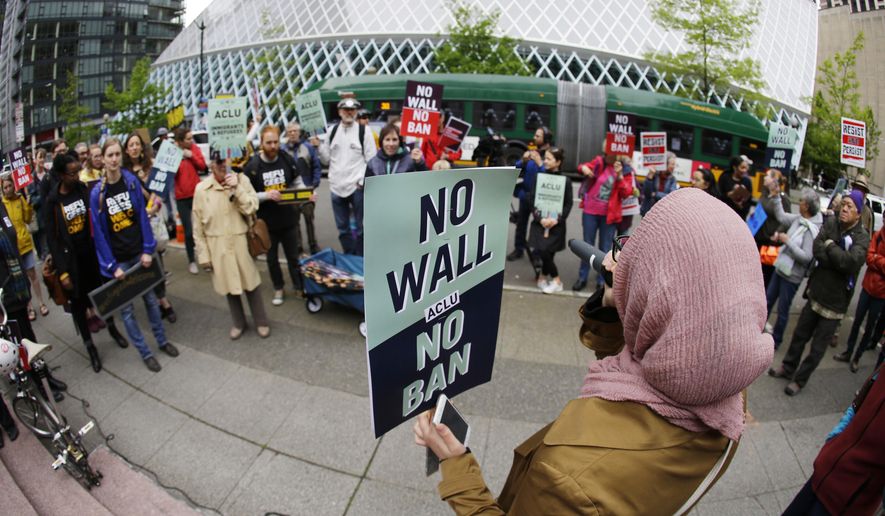A Trump administration attorney on Monday asked the U.S. Court of Appeals for the 9th Circuit to allow officials to at least review visa and immigration vetting processes and a temporary block on refugee resettlement as President Trump’s revised travel ban works its way through the courts.
During arguments in a lawsuit filed by Hawaii, Acting Solicitor General Jeffrey Wall said portions of the order blocked by a lower court “shouldn’t even be on the table” because Hawaii has no legal standing on topics such as refugee resettlement.
The request, made to a panel of three appointees of former President Bill Clinton, came at the end of oral arguments that had mostly focused on Mr. Trump’s comments about Muslims and the travel ban, and whether the court should consider factors other than the order’s wording and effect. But judges were curious about the scope of the lower court ruling, made by U.S. District Judge Derrick Watson in March.
Judge Michael Daly Hawkins asked attorney Neal Katyal, who argued for Hawaii, whether there was any justification for the interpretation that Judge Watson’s order blocked the government from carrying out studies about other vetting procedures.
“The government can and indeed has been conducting worldwide vetting and increased studies about all of these things,” Mr. Katyal said. “The injunction doesn’t ban studies at all, it only bans a specific study, which is a study designed to carry out what we view as the Muslim ban.”
The 9th Circuit is the second appellate court to hear arguments in a case challenging Mr. Trump’s travel order this week. The full 4th Circuit heard an appeal of a case from Maryland that had blocked a narrower portion of Mr. Trump’s revised order, which would temporarily ban refuge resettlement and for 90 days ban travel of foreign nationals of Iran, Libya, Somalia, Sudan, Syria and Yemen to the United States. The order has been temporarily blocked from taking effect while the merits of the cases are argued.
The three judges were also concerned with the degree to which they should considers Mr. Trump’s comments about the executive order as evidence that the motivation for the order was not just a security interest.
“The executive order sets out national security justifications, but how is a court to know if in fact it’s a Muslim ban in the guise of national security justifications?” Judge Ronald M. Gould asked Mr. Wall.
Mr. Wall pointed to the prior Supreme Court ruling in Kleindienst v. Mandel, which he said prevents the court from “second-guessing of national security determinations” if an order appears on its face to have a legitimate purpose.
The exception to that rule would be in a case in which there appeared to be bad faith on the part of the president, he said.
“Here you would need official capacity statements, that were unequivocal post-inauguration, to show the president and members of his cabinet were acting in bad faith and I just don’t think they can make that kind of a remarkable showing here,” Mr. Wall said.
Just hours before another lawsuit over the travel ban was heard on May 8 in the 4th Circuit, Mr. Trump’s campaign website was scrubbed of statements in which he called for a “shutdown of Muslims” entering the U.S.
Mr. Katyal said Mr. Trump has never disavowed statements he made on the campaign trail about stopping Muslims from immigrating to the United States.
Judge Richard Anthony Paez asked whether Mr. Trump’s statement’s would forever preclude him from other immigration reforms. Mr. Katyal said they would not, but noted the president might need to pursue legislation through Congress to do so.
“The government has not engaged in mass dragnet exclusions in the last 50 years,” Mr. Katyal said. “This is something new and unusual in which you’re saying this whole class of people, some of whom are dangerous, we can ban them all.”
Judge Hawkins noted that both sides had sought to construe Mr. Trump’s comments about the revised executive order in different ways.
“Why shouldn’t we be deferential to the office of the president of the united states on such issues?” he said.
“That is the million dollar question, Judge Hawkins,” Mr. Katyal said. “I don’t think there is any precedent in this court or any other, when you are thinking about what a reasonable observer would view as an establishment clause problem, that you defer to a government official. The whole test is an objective observer, not what the president thinks.”
He said the court doesn’t need to resort to “psychoanalysis or trying to get in the president’s head” to determine the true purpose of the order.
“You don’t, your honor need to be Sigmund Freud in order to affirm the District Court,” Mr. Katyal said. “You just simply must ask what would an objective observer think with these sorts of statements?”
• Andrea Noble can be reached at anoble@washingtontimes.com.




Please read our comment policy before commenting.